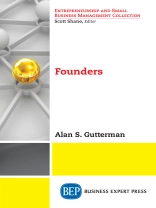This book is a must-have guide for anyone thinking about launching a new business and also is an excellent resource for attorneys and other professionals providing advice to their clients and academics teaching entrepreneurship classes.
The terms founder and promoter are used frequently when discussing new businesses. Neither of these terms has a particular technical legal meaning and they are used somewhat interchangeably in practice. However, it is useful and accurate to think of a founder as a person who assists in the formation of a new business and then continues to devote a significant amount of time and resources to the operation of business once it has been formed. The founders often become the officers, directors, general partners or managing members, and the term ‘founding shareholder’ or ‘founding president, ‘ for example, is often used to refer to one of the first shareholders of a corporation or a corporation’s first president. A promoter, on the other hand, is a person, including possibly a legal entity, who assists in the formation of a business entity or obtaining subscriptions for its ownership interests, but who does not necessarily have any continuing relationship to the business once it is formed and funded. It is not surprising to find that founders play a pivotal role in the success of any new business even in situations where the founder is active in the business for only a short period of time and responsibility for oversight of the business is turned over to professional managers who were not affiliated with the business at inception. Founders not only bring the original business idea to the table, they also have a substantial influence on the organizational culture and values and goals of the initial managers and employees that lives on for a significant period of time.
This book covers a variety of topics relating to founders, beginning with an overview of the motivational traits of prospective entrepreneurs and the role that entrepreneurs play in launching new businesses and then moving on the personality traits and skill sets of those persons who seek to form new business followed by a discussion of some of the practical issues relating to founders with respect to their pre-formation duties and liabilities, particularly their relationships with prior employers, and their relationships and agreements with other members of the founding group. The book also examines the role that founders have on the organizational culture of their firms and the positions that founder occupy if and when their firms reach the point where they are ready to take on the rigors of public company status and complete an initial public offering of their securities.
लेखक के बारे में
Dr. Alan S. Gutterman is the founding director of the Sustainable Entrepreneurship Project. In addition, Alan’s prolific output of practical guidance and tools for legal and financial professionals, managers, entrepreneurs and investors has made him one of the best-selling individual authors in the global legal publishing marketplace. Alan has also authored or edited over 40 books on sustainable entrepreneurship, management, business law and transactions, international law, business, and technology management for a number of publishers. Alan has over three decades of experience as a partner and senior counsel with internationally recognized law firms counseling small and large business enterprises in the areas of general corporate and securities matters, venture capital, mergers and acquisitions, international law and transactions, strategic business alliances, technology transfers and intellectual property. He received his AB, MBA, and JD from the University of California at Berkeley, a DBA from Golden Gate University, and a Ph D from the University of Cambridge.












